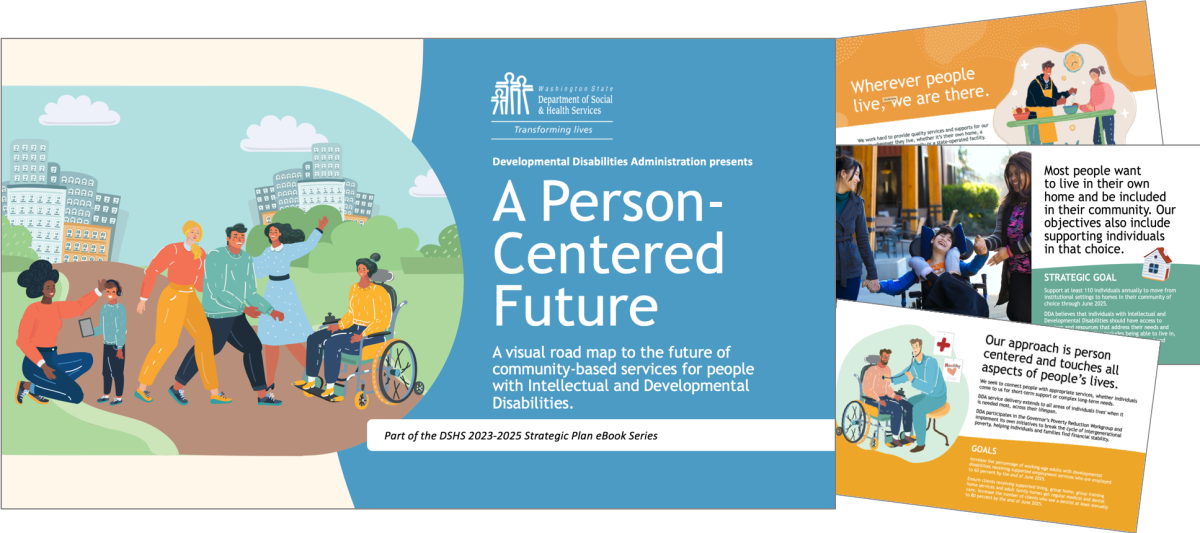 |
A Person-Centered FutureA guide to Developmental Disabilities Administration's strategic plan for the 2023-2025 planning cycle. |
|---|
From increasing employment supports to finding supportive living options in people's communities, the future of services for people with intellectual and developmental disabilities and their families in Washington state is bright.
 |
Read and download DDA's 2023-2025 Strategic eBook here> |
|---|
DDA's 2023 - 2025 Strategic Plan
DSHS Developmental Disabilities Administration’s 2023 - 2025 Strategic Plan
In the strategic planning process, we identify three key components.
- The Strategic Objective: Sets the goal that we are striving to achieve.
- The Action Plan: Our action steps to get there.
- The Success Measure: The outcome that would let us know we have achieved that goal by 2025.
Read in detail below about all of the components of DDA's strategic plan. To read about DDA's Strategic Plan Metrics, read the full report here.
Strategic plan index: Jump to a section of the plan by clicking the Strategic Objective.
- Strategic Objective #1: Support individuals with developmental disabilities to be able to receive services that support them in living in their own communities rather than in institutional settings.
- Strategic Objective #2: Use available funding to provide the services and supports needed.
- Strategic Objective #3: Increase the number of working-age adults with a developmental disability who are employed.
- Strategic Objective #4: Ensure that services and supports provided to clients in certified residential settings meet regulatory requirements and quality of care standards.
- Strategic Objective #5: Continue to train DDA employees and support Equity, Diversity, Access, Inclusion and Belonging in the workplace and through public outreach as well as staff and stakeholder communications.
Strategic Objective #1: Support individuals with developmental disabilities to be able to receive services that support them in living in their own communities rather than in institutional settings.
The Action Plan:
- The waiver committee will review the capacity tracking report to determine available capacity prior to reviewing requests for enrollment.
- The waiver committee will conduct weekly meetings to review enrollment requests and determine if they should be approved or not.
- DDA will continue to monitor the waiver caseload to determine if there is capacity and funding available to support new enrollment requests for access to waiver funding and services.
- Provide a monthly report on the capacity of the Core waiver and disposition of waiver enrollment requests to be reviewed by waiver committee.
- Partner with DDA EDAI administrator, tribal liaison and Language Access and Logistics coordinator to expand and diversify provider pool.
- Statewide RCL/Transition teams meet monthly to discuss progress and problem-solve issues related to transition work.
- RCL QIS compiles quarterly RCL transition data for strategic performance metric to track progress towards 110 annual transition goal.
Success Measures:
- Support at least 110 individuals annually to move from institutional settings to homes in their community of choice by June 2025.
- Increase enrollment in the Basic Plus waiver from 11,406 to 12,111 individuals by June 2025.
- Increase enrollment in the Core waiver from 4,499 individuals to 5,692 individuals by June 2025.
- Increase the percentage of DDA clients served in home and community-based settings from 98.5% in March 2023 to 99% by June 2025.
- Increase the number of home and community-based settings providers by 5% by June 2025.
- Reduce the number of individuals on the No Paid Services caseload by 1,000 to get them into services by June 2025.
Strategic Objective #2: Use available funding to provide the services and supports needed.
The Action Plan:
- The DDA executive leadership team will review caseload activity each quarter.
- The waiver committee will review the capacity tracking report to determine available capacity prior to reviewing requests for enrollment.
- The waiver committee will conduct weekly meetings to review enrollment requests and determine if they should be approved or not.
- DDA will continue to monitor the waiver caseload to determine if there is capacity and funding available to support new enrollment requests for access to waiver funding and services.
- Partner with DDA EDAI administrator, tribal liaison, and Language Access and Logistics coordinator to educate clients and families about service options.
- Make accessible resources available, such as videos with closed captioning and translated documents.
Success Measures:
- Maintain an average quarterly caseload of at least 6,500 clients on the Individual and Family Services waiver through June 2025.
- By June 2025, increase the number of unique clients who access Assistive Technology by 16.7% from the July 2021 – June 2023 baseline.
- By June 2025, increase the number of unique clients who access Remote Supports by 32.4% from the July 2021 – June 2023 baseline.
Strategic Objective #3: Increase the number of working-age adults with a developmental disability who are employed.
The Action Plan:
- Provide regional management, employment specialists and counties with quarterly data showing supported employment outcomes by acuity and provider.
- Use appropriated funding to expand capacity on the Basic Plus waiver for individuals who are age 21, graduating from high school, Medicaid-eligible and interested in pursuing supported employment services.
- Continue the expansion of the Job Foundation project to increase work experience for transition age clients.
- Continue funding statewide provider training and technical assistance opportunities to increase the quality of services and client outcomes.
Success Measure:
- Increase the percentage of adults age 21 and up with developmental disabilities receiving Supported Employment services who are employed to 75% by June 2025.
Strategic Objective #4: Ensure that services and supports provided to clients in certified residential settings meet regulatory requirements and quality of care standards.
The Action Plan:
- Review performance data quarterly with central office and regional executive management teams to ensure targets are met and to note any issues.
- Provide certified residential service providers with training and technical assistance.
- Share community activity data and promote residential providers’ support of community activities at regional provider meetings.
- Follow up, involve case management and provide technical assistance as appropriate for clients identified to have two or fewer community outings in sampled weeks.
- Provide access to online training and encourage residential provider staff to support clients in accessing community-based activities.
Success Measures:
- Certified residential service providers sampled will support clients to access community-based activities at least five days per calendar week during the 2023-25 biennium.
- Certified residential providers will receive fewer than five mandatory reporting-related citations per quarter by June 2025.
Strategic Objective #5: Continue to train DDA employees and support Equity, Diversity, Access and Inclusion through public outreach as well as staff and stakeholder communications.
The Action Plan:
- Review performance data with the executive management team related to EDAI each quarter.
- DDA will continue to train management and staff about Equity, Diversity, Access and Inclusion principles.
- DDA will expand on Certified Diversity Executive/Certified Diversity Professional learning.
- Ensure identified key positions complete instructor led DSHS 7.01 American Indian Policy training through the Washington State Learning Center.
- Key identified positions: DSHS managers and employees in positions that have decision making authority or policy-changing authority, in regional or headquarters offices, whose emphasis of responsibility is working in conjunction or association with the American Indian and Alaska Native tribes and recognized American Indian organizations.
- DDA Tribal Affairs will provide quarterly reports to executive leadership and the IPAC Subcommittee regarding the status of ongoing activities.
Success Measures:
- Increase the percentage of DDA employees who have completed DSHS DDA Cultural Humility and Diversity in Service Delivery Training or other relevant EDAI trainings in the 2023-25 biennium by June 2025.
- Increase the number of DDA employees who receive certification as Certified Diversity Professionals or Certified Diversity Executives in the 2023-25 biennium to 35 by June 2025.
- All key identified positions will complete DSHS 7.01 American Indian Policy Training by June 2025.
- Increase the percentage of DDA employees who completed DSHS 7.01 American Indian Policy, DSHS Government to Government, DSHS DDA Core training, or Values in Action to 25% by June 2025.
